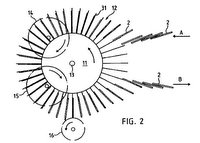 Even amendment can't help
Even amendment can't helpThe IPKat tripped over this on BAILII: it's yesterday's decision in Ferag AG v Muller Martini Ltd [2006] EWHC 225 (Ch), a Patents Court ruling of Mr Justice Lewison.
Lewison J ditched Ferag's claim. The invention, whether in its original or amended form, was obvious in the light of the prior art. The IPKat feels sorry for Ferag: this is another of those cases where the patent owner had gone to great lengths to make his invention look and sound inventive: indeed, if as much invention had been shown by the inventors as was shown by Ferag's legal team, the outcome might have been quite different.
This little morsel appeared on Butterworths' continuingly excellent All England Direct subscription service. Quid Novi Ltd and another v Innvotec and others, another Chancery decision of Mr Justice Lewison yesterday, this time being in the field of copyright.
Quid Novi, who had a business plan for a tax-efficient scheme for carbon trading, alleged that substantial parts of the plan had been copied by B on behalf of Innvotec. The plan had been supplied to B, who had a general outline of its content in mind when he wrote the allegedly infringing document. But it was denied that he had copied the bits of the plan set out in Quid Novi's claim. Suing for copyright infringement, Quid Novi sought summary judgment. No, said Innvotec, the case had to go to a full trial because (i) B might have copied from a document other than the plan and (ii) without disclosure by Quid Novi, it was not possible to show that its plan was an original work in the first place, since B had relied on certain research which he had detailed in the plan.
* Once a claimant’s legal rights had been determined, and the determination of those legal rights would in the ordinary way have resulted in a judgment, he ought in principle to be given judgment unless very strong reasons existed to the contrary.The IPKat is a bit anxious about this. While he likes the idea of summary judgment and disapproves of using disclosure (discovery) as a fishing expedition in the hope of finding some flaw in an IP owner's case, he wonders how the learned judge could have regard to "the state of the evidence ... as it might have been after disclosure and trial": it's a neat trick and certainly beats the hassle of hearing the real evidence when you're pretty certain the defendant's an infringer. Merpel wonders if the defendants' eyes were too close together and they had a sort of shifty look about them ...* Having regard to the state of the evidence both at the time of the application and as it might have been after disclosure and trial, there was nothing to suggest that Innvotec had a real prospect of successfully challenging the originality of the plan or of establishing that B had copied from a source other than the plan.
* There being no other compelling reason for the issue of copyright infringement to go to trial, the court would grant summary relief in respect of certain items identified in the particulars of copying.
LOUSY PATENT - EVEN AMENDING IT WON'T HELP; QUIDS IN WITH SUMMARY JUDGMENT
![LOUSY PATENT - EVEN AMENDING IT WON'T HELP; QUIDS IN WITH SUMMARY JUDGMENT]() Reviewed by Jeremy
on
Thursday, February 23, 2006
Rating:
Reviewed by Jeremy
on
Thursday, February 23, 2006
Rating:




![[Guest post] Copyright in fictional universes](https://blogger.googleusercontent.com/img/b/R29vZ2xl/AVvXsEhDz8qEI-Pr1plKexJSb7mic9ZAjt4hILsQit53fnw9R2bychPhbkSkcY54E2__bZ04ndQ98loZFMDS5lSXGe7Up7dZ7fGRi1V7UWjE_XQGpsJhQTybsh9xzyID0f4ABY0OUkjBmBVZ449fCSGHxevyzH3tK_XtXRBdvfI4Lkr_7xGAleFvGiRSmA/s150/RR-OFFPLEX-p28-29-2.webp)

![[Guest post] The UK’s AI and copyright consultation – will data protection law render any commercial TDM exception ineffective?](https://blogger.googleusercontent.com/img/b/R29vZ2xl/AVvXsEjbUiGfTD43fEv8X8tQGvijKMJMnDC6oSPVCTILFF64TOPyIhkSFkt28Coa7C0bu4UGcLvN0T2Xz1xLNNxrlG5jgQRdf1NS67AZu9o6gzC8V0m-LCdkYfN8MJT5bIYojtxFLV-DUfhzuYGuB-jwT5qyaVNBpFFX4VK7-7301078eEuxEJ7rDqpkbg/s150/istock-1135379026_unrestricted_1110x800_0.webp)









No comments:
All comments must be moderated by a member of the IPKat team before they appear on the blog. Comments will not be allowed if the contravene the IPKat policy that readers' comments should not be obscene or defamatory; they should not consist of ad hominem attacks on members of the blog team or other comment-posters and they should make a constructive contribution to the discussion of the post on which they purport to comment.
It is also the IPKat policy that comments should not be made completely anonymously, and users should use a consistent name or pseudonym (which should not itself be defamatory or obscene, or that of another real person), either in the "identity" field, or at the beginning of the comment. Current practice is to, however, allow a limited number of comments that contravene this policy, provided that the comment has a high degree of relevance and the comment chain does not become too difficult to follow.
Learn more here: http://ipkitten.blogspot.com/p/want-to-complain.html